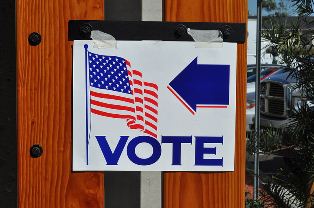 OLYMPIA, Wash. (AP) -- Some 24 million voter registrations in the United States contain significant errors, including about 1.8 million dead people still on the rolls and many more approved to vote in multiple states, according to a report released Tuesday.
OLYMPIA, Wash. (AP) -- Some 24 million voter registrations in the United States contain significant errors, including about 1.8 million dead people still on the rolls and many more approved to vote in multiple states, according to a report released Tuesday.
Even though the inaccuracies impact one in eight registrations, researchers at the Pew Center on the States said they don't see it as an indicator of widespread fraud. Rather, they believe outdated systems are failing to keep pace with the most basic changes in people's lives, feeding perceptions that U.S. elections are not as airtight as they could be.
In conjunction with Pew's report, eight states said they are working this year on a centralized data system to help identify people whose registrations may be out of date.
"A lot of people probably assume we do this already," said Sam Reed, who oversees elections as Washington's secretary of state. "I think it's going to bring more trust and confidence in the election system."
About 2.7 million people have active registrations in multiple states, including about 2,000 people registered in four or more states, according to the Pew report. Elections officials said it is difficult to track when someone has moved to another state without canceling their previous registration.
Some 1.8 million deceased people are still listed as active voters, according to the study, which is based on a computer analysis of a proprietary voter database used by Democrats. Researchers believe 12.7 million records do not reflect the current addresses of active voters while 12 million contain address inaccuracies, including those that make it unlikely that mail could reach them.
Some of the files contain multiple problems, with Pew estimating that a total of 24 million have problems.
The numbers are at least partially supported by anecdotal evidence. For example, Washington state and Alaska - one of the nation's least populous states - compared each other's voter registration systems last year and found an estimated 4,500 duplicates.
The eight states involved in the centralization project are Colorado, Delaware, Maryland, Nevada, Oregon, Utah, Virginia and Washington.
Pew believes the centralized system and online voter registrations will help save money by eliminating the need to print millions of forms, enter data by hand or send mail to outdated or incorrect addresses.
"That's a tremendous cost to the taxpayers," said David Becker, director of Election Initiatives at the Pew Center on the States. The centralized system has not settled on participation fees yet but is expected to be in the tens of thousands of dollars per state per year.
The Brennan Center for Justice, which has been working on voter registration issues, is also pushing for a modernization of the system but cautions that states need to take particular care to not rush to eliminate voters from their rolls. Lawrence Norden, an attorney at the center, said there have been a number of cases in recent years where people have been improperly removed from the system based on an incomplete match - for example, two people who have the same name and birthdate.
"This is something that has to be done very carefully," he said.
Some states have adopted laws in the last couple years to require photo IDs to vote - hoping it would prevent fraud even though examples of such cheating are rare. That tactic was one the Brennan Center is directly opposing.
Linda Lamone, the administrator of elections in Maryland, said the Pew work has already pushed the state toward online voter registration, which will also allow voters to update their information electronically. Maryland has also changed its system so that voters who choose to register while getting a driver's license must complete the process there. Previously, voters had to separately file paperwork and the state ended up having conflicting information about registrants.
Lamone said dead people who are registered in the state but end up dying in another state that does not actively share death information can leave deceased voters on the rolls. She said the centralized system will help ease those administrative challenges.
"We're going to get better information on voters," she said. "Overall, it's going to result in much more accurate voter registration lists."
---
Associated Press writer Mike Baker can be reached at http://twitter.com/MikeBakerAP
© 2012 The Associated Press. All rights reserved. This material may not be published, broadcast, rewritten or redistributed. Learn more about our Privacy Policy and Terms of Use.
- Home
- News
- Opinion
- Entertainment
- Classified
- About Us
 MLK Breakfast
MLK Breakfast- Community
- Foundation
- Obituaries
- Donate
04-19-2024 10:42 am • PDX and SEA Weather






















































































































































































































































































































